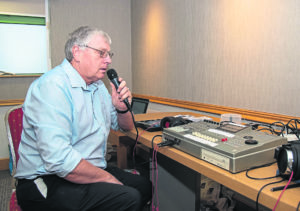If, before meeting Alan Gilchrist, you had asked me to perform a knowledge-dump on the topic of hypnosis, you would not have had to listen to me for very long at all.
Assuming, in the first instance, that I obliged your strange request to exhaustively expound on this murky, misunderstood subject, chances are that the brevity of my response would have come as quite a relief, given the confused, convoluted waffle that likely would have spilled from my mouth.
I admit that I was pretty clueless – but no more clueless than the next person.
Because, as far as I can tell, hypnosis is something that, to the majority, is still shrouded in mystery.
Sure, most of us have vague ideas, usually involving deep sleeps and trances, but, with the exception a few professionals, a handful of psychologists, and only certain percentage of those who have actually undergone a session or two, most of us know little – or nothing – about what hypnosis actually is.
So, last Saturday, armed only with a few unhelpful assumptions sown by TV mentalist, Derren Brown, I walked into a spacious room in the business wing of the Silverbirch Hotel to meet a man who would demystify for me the art, practice and state of hypnosis.
His name was Alan Gilchrist, a hypnotherapist from Belfast with 37 years of experience, and he was going to give me a taste of what it was to be hypnotised.
“So, Emmet, you are here to give me the grilling,” Alan said, as he held open door for me with his fingertips.
Fresh-faced with a disarming smile, Alan did not speak with the practised professional neutrality I expected. Rather, his tongue still retaining a welcome twang that told where he was from.
“I started practicing hypnotherapy during the Troubles,” said the Belfast man. “The city was a war zone, and the victims of that war wanted a quick way to get back into the business of living.”

Trauma had swept Belfast, but, though pocked and burned, the wheels of the city continued to turn. And its people had to turn with them.
“A lot of that early work was to do with helping people with what they would have called ‘their nerves’. They were scared to go to the shop, afraid to travel to work, consumed by panic every time they passed a particular place,” Alan said. “I made it my job to give them a fast-tracked means of getting over these debilitating anxieties, fears and phobias.”
Bullet-riddled Belfast sounded to me like a good training ground. Morbid as it might be, you would think that if you can help people overcome fears born of the Troubles, then, regular, everyday problems should be comparatively easy to address.
“Hypnotism,” said Alan, as though revealing the great, simple secret, “is just a state of relaxation…
“People get the idea from stage shows that to be hypnotised is to be put into a kind of docile, semi-conscious, trance-like state. This is not the case. About ten per-cent of people will fall into this kind of state, but most remain awake and remember everything that has happened,” Alan said.
This, I must admit, slightly disappointed me. I had thought that I would be lured into some kind of fugue state, floating somewhere between wakefulness and a dream.
This, Alan said decisively, was highly unlikely.
“So what do you usually treat people for, and what is the weirdest request you’ve ever received from a prospective subject?” I asked childishly.
Alan indulged me, avuncularly.
“The thing you need to know Emmet, is that every person who comes through my door has a problem which they want fixed,” he said, with a great degree of emphasis.
“People come to stop smoking, lose weight, overcome illogical fears, phobias of people, places, spaces, animals, objects or a potential situations. They come to overcome problems that they really want to overcome.
“Hypnotherapy is a two-way street.
“It is me and the person seeking help, working together to improve their life,” said Alan.

“But,” I interjected, “how powerful can the impact be? How transformative can the results be?”
Alan pointed first to the vast numbers of people who have stopped smoking, lost astonishing amounts of weight, overcome crippling shyness, and learned to laugh at things that once terrified them to the point of paralysis.
“I would call those changes powerful – but this is what I am trying to say, it was not me that did that, it was them.
“I helped, but in the end they did it themselves.”
Thinking I had got the picture, I asked if I could have a go.
Handing me a set of over-ear headphone and a weird digital blindfold thing, he said, “Put these on.”
Soft music, ethereal but also not dissimilar to that you might hear in a lift, played through the headphones.
“Close your eyes, and keep them closed throughout,” said Alan over the headphones, his voice noticeably different from before. Softer, resonant, more relaxing.
Lights twinkled, opening up a sort of internal galaxy behind my eyelids.
“Relax, relax, relax,” said Alan.
For the next, seemingly interminable, while, Alan spoke softly over the microphone, instructing and guiding me on a trip through my own mind.
The purpose, said Alan, was to relieve me of stress, and help me engage with the present moment.
I do not have a particularly vivid imagination, and rarely am I able to conjure scenes and pictures that compare with those of reality. However, at one point during the session, I sat cross-legged on the shore of a tranquil lake, the setting sun not so much shining but burning upon it, setting the surface of the water alight in deep, rich, peaceful orange.
When I took the gadgets from my face, my breathing was slow and my mind was clear. I was more relaxed.
“I’ll send you the recording of that and you make sure to listen to it every night for a month,” said Alan, with a smile.
I guess we will see how I am getting on in 30 days’ time!







